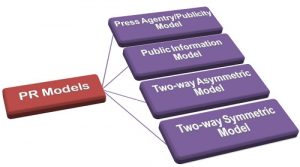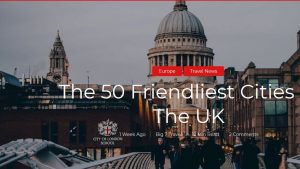IN LAST WEEK’S LECTURE AND THIS WEEK’S SEMINARS, WE HAVE BEEN LOOKING AT PERHAPS THE BEST KNOWN THEORY IN PR – GRUNIG AND HUNT’S 4 MODELS.
Since 1984, PR scholars and academics have been citing and debating the merits of publicity, public information, persuasion – and whether we have reached the best practice of mutual understanding and engagement.

But while a trawl through any newspaper, magazine or online news outlet will reveal plenty of examples of the first three models, finding the pinnacle of model 4 – two way symmetrical engagement – is trickier.
That’s why, the last model is often seen as an ideal rather than a reality and why Grunig’s concept is often referred to as as the excellence model. It’s about excellent communications practice and on that basis we can understand why the model can have its detractors.
This article from the CIPR produced Influence website called time on the 4 models while our guest lecturer Stephen Waddington has explored the relevance of the excellence idea in the digital age.
While some organisations claim to have balanced, mutual understanding and engagement with their publics, surely in a commercial context at least, they exist to make a profit and therefore communication will always be geared towards achieving that goal. Yes, they’re listening, they’re even responding, but would they really risk profit at the expense of appeasing the conflicting demands of many different publics? We can’t really knock organisations for taking that stance and certainly there has been research which suggests that publics want to take the lead from brands, particularly those they trust and are loyal to.
Social responsibility, or the idea of being good corporate citizen, is where organisations can perhaps take the biggest strides towards excellent balanced communications. A business that makes a profit while genuinely seeking to adapt and meet the needs of its publics, is surely acting in a more balanced manner, with focus on mutual understanding – it’s a win win situation. But as we will find out in a few weeks, much CSR activity is little more than empty statements dressed up as goodwill with the primary goal of securing market advantage.
The truth is, there has not really been a better model developed in the last 35 years to plot the development of communications behaviour of organisations. Perhaps the best way to think about Grunig and Hunt’s 4 models is to consider what they are trying to achieve with stakeholders – for publicity, think the public be fooled or damned; then the ticky box of keeping them informed; using unbalanced persuasion to contact and convince or even control; through to conversations and engagement.
And as we have witnessed in the last few years, the fake news propaganda of our political leaders and campaigners, has actually taken us further and further away from genuine engagement. But for every Trump, there’s a Thunberg, and for every Cummings, a community champion champing at the bit to influence and engage – sometimes the biggest and most impactful social change comes bottom up activism, for example, the ban on fox hunting, same sex marriage and now climate change. Excellent communication and engagement is alive and thriving, but it’s not necessarily coming from the traditional sources we have trusted to lead and guide us – big business, government, politicians and celebrities. It’s now at a much more local, micro level – influencers, opinion leaders and activists – and that should give us all some hope that 2-way comms is not an unachievable ideal, but a real opportunity for authentic engagement driving societal change for all.


